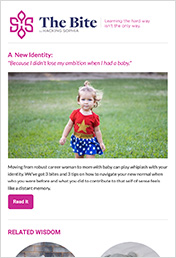Working to integrate work and child, life and partner are difficult, especially in the early days, and sometimes we’re not sure we can pull it all off. For many CIAIY moms, the emotional bind of wanting to be successful in a career and the tug of feeling like they should be home with the kid(s) is draining. The evidence indicates the psychological relief of making the commitment to be ‘in’ at work, reducing the cycle of ruminating around that choice, is a good thing.
WHY
Cycling through ‘should I still be working?,’ ‘work is important to my self-esteem,’ ‘is my baby ok without me?, ‘should I stay home?’ is not only emotionally draining, it’s counterproductive in your ability to succeed. Research shows that anxiety messes up our decision-making by reducing our brain’s capacity to process thoughts in a logical, rational way. Not only are your worry and negative thoughts emotionally consuming, they’re shutting down certain connections in your brain, making your brain less able to think clearly and make better decisions.
Once you decide you’re really committed to continue working, you’re freer to take steps to get through it.
What To Do (Bites)
-
Commit to being ‘in’
The emotional whirlpool of indecision, which is anxiety provoking, clouds your abilities to think straight and make sound decisions. Further, research supports that pessimistic thinking, ‘this isn’t going to work,’ ‘my baby will suffer,’ leads us to anticipate bad outcomes. You may very likely have doubts about your choice, but there’s something therapeutic about making a decision and cutting off self-punishing rumination, even if it’s not easy. While possibly counterintuitive, just making the choice to be ‘in’ will provide relief.
-
Focus your mind on solving, not letting the emotion creep in.
When emotion seeps back into problem solving (e.g. “I really should be the one to take her to baby music class…”), it will distract you back to an emotionally unproductive place and cloud your decision making. Your thoughts, feelings and behaviors are intertwined, but if you proactively change one, the other two will catch-up (‘my baby is just fine, he’s being well taken care of, his needs are being met and he’s in a loving, supportive environment’).
-
Make it okay to revisit your choice.
Decisions to work, where to work, how to work do not have to be life commitments. It’s important to reassess from time to time and think through, what’s not working? Where do I need more support? What resources do I need to make this better? Where does my career fit in my priorities?
I expressed my uncertainty about returning to work full-time to my friend, who is also a lawyer and mom. She told me ‘remember it’s OK if my plans change. This might be your plan now, but it’s OK if that changes later.’
Tips
-
It’s helpful to remember why you work. Research shows that after women have children, they say their work decisions are made for their families. That could be “I need to work to support my family’s financial needs” rather than what they described prior to children, e.g. “I work because it brings me fulfillment, intellectual challenge, etc.” It can be both, but weakening or ignoring the latter can create added dissatisfaction.
-
Research on coping behaviors in response to work-family conflict suggests: think about what it would take to make managing both more manageable. Consider what you need to negotiate to ease your workload (e.g. expanded team, assistant support), what you can outsource, and ruthlessly prioritize your new list of ‘what really matters to you.’
-
Social support is also an important coping mechanism. Having an Outlet Friend, the person you can share your frustrations with, can understand and lend an ear and advice, is helpful.
Someone once told me ‘reality is your friend.’ When things are not exactly the way you want, it truly doesn’t help to be resentful or wish things were different. The sooner you accept what the reality is, the better able you’ll be to come up with a new approach, plan, or perspective.
Hope you found this helpful! Got a topic you’d like some wisdom on? Let us know.




